DUBAI: In January this year, Ameera Souheil Al-Halabi, 19, from Akkar in Lebanon, left her family and her country to begin life as a first-year student of medicine at a university in Ivano-Frankivsk, in western Ukraine.
For Al-Halabi and her brother, a third-year student of engineering at another Ukrainian university, being away from Lebanon was a huge relief. Despite its many political and economic problems, Ukraine seemed a world away from the power cuts, fuel shortages, corruption and dysfunction back home.
“I had decided to study in Ukraine because the situation was relatively better there and the expenses were manageable,” she told Arab News on Wednesday from a hotel in Krakow, Poland.
The siblings’ hopes of a stable life and a good education in a foreign country were dashed, however, when Russian forces invaded Ukraine on Feb. 24 after weeks of rising tension.
An estimated 10,000 students from across the Arab world, including about 1,300 Lebanese people, were studying in Ukraine before the invasion, part of a 760,000-strong population of international students. Many of them have posted video footage online asking for help.
Among Arab countries, Morocco had sent the largest number of students, around 8,000, followed by Egypt with more than 3,000.
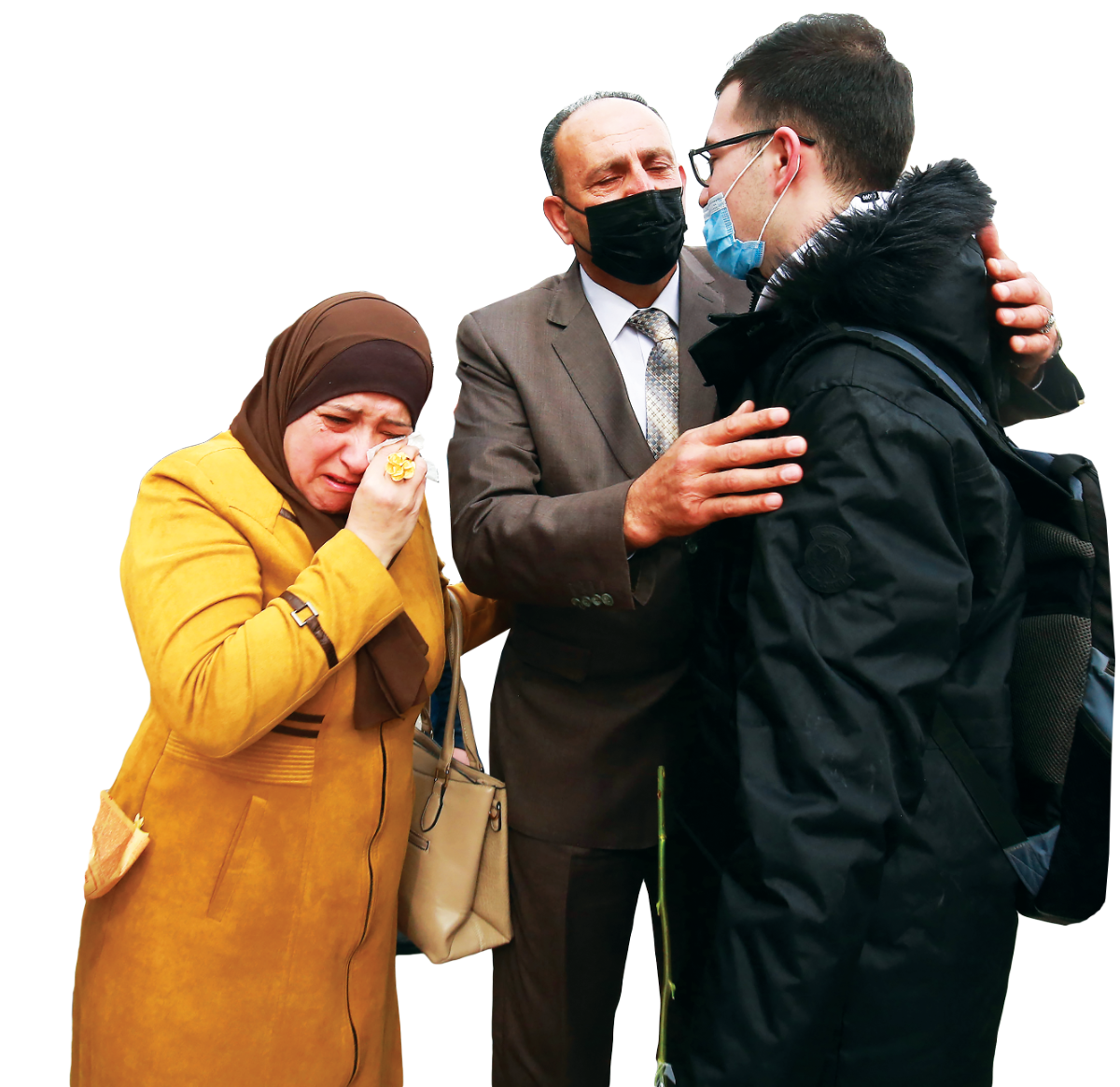
Jordanian nationals arrive in Amman from Romania after fleeing Ukraine in the wake of the Russian invasion. (AFP)
What drew foreign students to Ukraine was the low cost of living and, in many cases, the relative safety compared with their own countries. Ukrainian universities also have a strong reputation for medical courses and affordable tuition.
But now families from Morocco to India, and Nigeria to Iraq, are desperately appealing for help from their governments to get their sons and daughters out of the war-torn country. African students have been sharing their experiences online using the hashtag #AfricansinUkraine.
At least two students — one from India and another from Algeria — have been killed in Kharkiv, Ukraine’s second largest city, which witnessed some of the war’s heaviest shelling on Monday.
FASTFACT
760,000
Foreign students in Ukraine in 2020.
Abdallah Bou Habib, Lebanon’s foreign minister, said the government is drawing up plans to help nationals trapped in Ukraine. Planes will be sent to Poland and Romania at a “date to be announced later,” he said.
Others like Egypt have started running repatriation flights from neighboring countries. Thirty Egyptian students have returned so far. For Tunisia, which does not have an embassy in Ukraine, getting in touch with its 1,700 citizens there is complicated.
Authorities said they have been in contact with international organizations such as the Red Cross to arrange repatriation of Tunisian nationals. “We will begin the operation as soon as we have a full list of how many Tunisians wish to return home,” Mohammed Trabelsi, a foreign ministry official, told AFP.
Authorities in Algeria, which has not asked its 1,000 nationals in Ukraine to leave, told them to stay indoors and venture out only “in case of an emergency.”
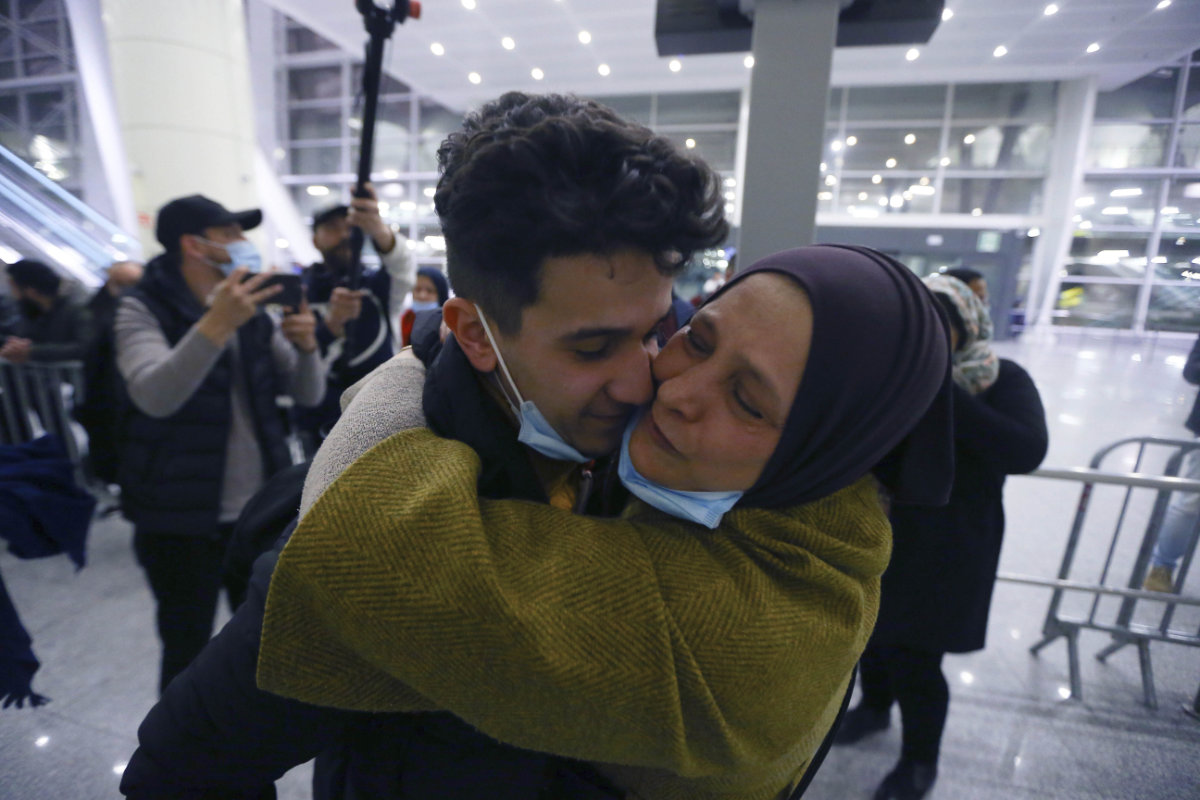
An Algerian student studying in Ukraine is embraced by his mother as he arrives at Algiers airport on March 3, 2022, on a repatriation flight Kyiv. (AP Photo/Anis Belghoul)
Al-Halabi, the Lebanese student, said she and her brother began looking for ways to get out of Ukraine as soon as they heard the news of the invasion. She described the escape of the 10 Lebanese at Ivano-Frankivsk Medical University as a harrowing experience.
It took the group several days to reach the Polish border, she said, adding: “We walked over 40 kilometers after the taxi left us. No one helped us. We went three to four days without food or enough water. It was very cold. We moved through snow and rain.
“No one gave us any plan for evacuation, so we decided to do it on our own. We were all together until we reached the Polish border, when we got separated. Some of us went ahead while the others stayed behind.”
More than 1 million people have fled Ukraine in the week since Russia’s invasion, the UN has said, adding that unless the conflict ends immediately, millions more are likely to leave.
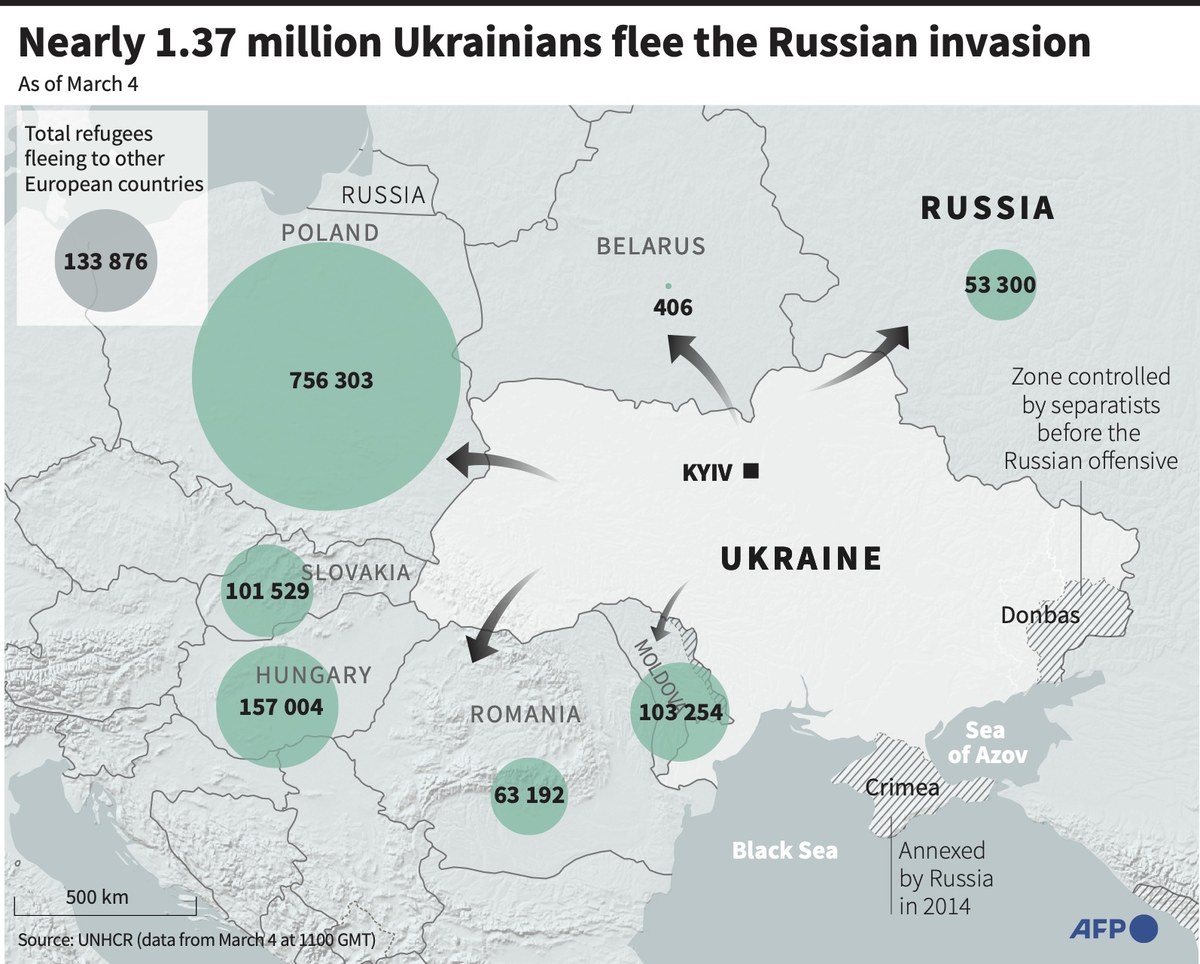
“In just seven days we have witnessed the exodus of one million refugees from Ukraine to neighboring countries,” Filippo Grandi, the UN refugee chief, said on Thursday.
Many Arabs who have waited in vain to start a new life in the West have been comparing their fates with those of Ukrainians to whom European states have now opened their arms.
Activists and cartoonists have contrasted the Western reaction to the refugee crisis triggered by Russia’s invasion of Ukraine with the way Europe sought to hold back Syrian and other refugees in 2015.
Last year 3,800 Syrians sought protection in Bulgaria and 1,850 were granted refugee or humanitarian status. Poland’s government, which faced fierce criticism for using force to stop migrants crossing from Belarus, has welcomed the new arrivals from Ukraine.
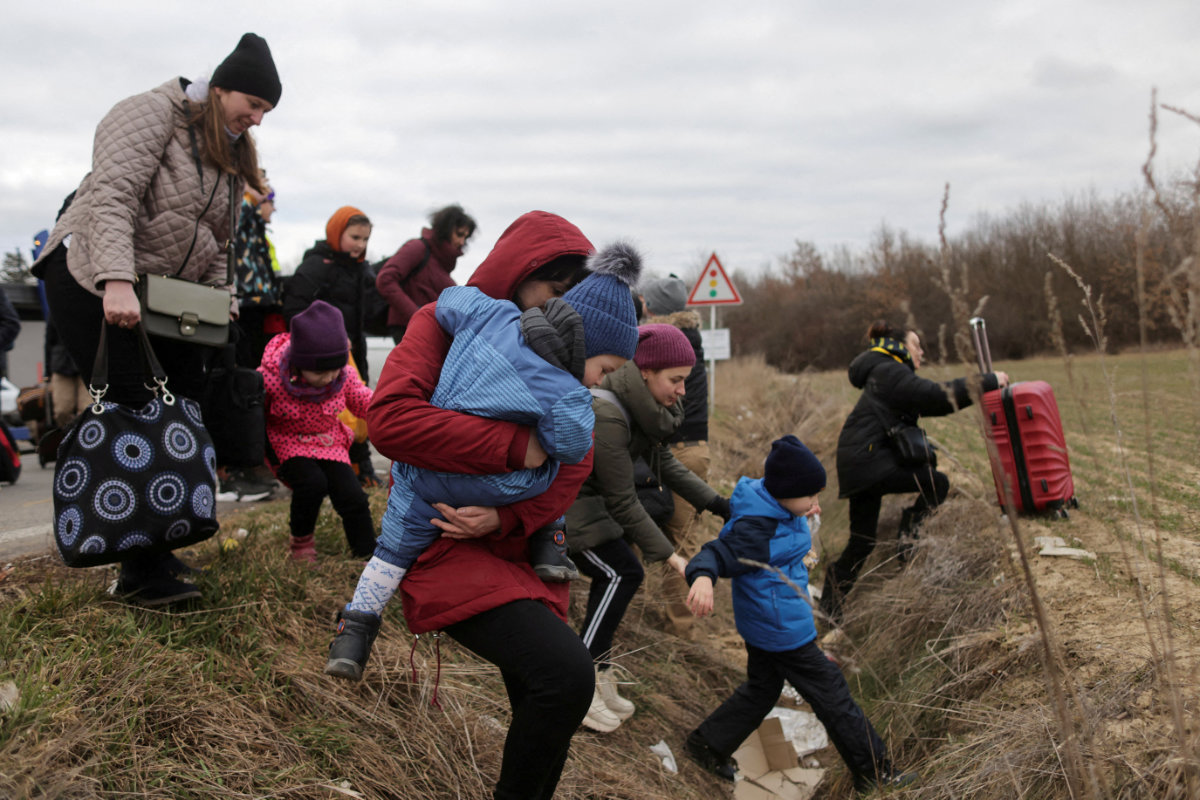
People fleeing the Russian invasion of Ukraine walk towards a transport helicopter (not shown in photo) after arriving in Slovakia on March 5, 2022. (REUTERS)
In Hungary, which built a barrier along its southern border to prevent a repeat of the 2015 influx of people from the Middle East and Asia, the arrival of refugees from Ukraine has triggered an outpouring of support along with offers of transport, accommodation, clothes and food.
Some Western journalists and officials have been criticized for suggesting that the crisis in Ukraine is different from those of Syria, Iraq or Afghanistan, because Europeans can better identify with the victims of the Russian invasion.
“We have here not the refugee wave which we are accustomed to, and we do not know what to do with people with an unclear past,” Kiril Petkov, Bulgaria’s prime minister, said, describing Ukrainians as intelligent, educated and highly qualified.
“These are Europeans whose airport has been just bombed, who are under fire.”
While some Arab refugees in north Syria, Lebanon and Jordan told Reuters that responsibility for their plight lay with countries closer to home, the perception of a double standard in European attitudes to people fleeing wars in Ukraine and the Middle East will be hard to dispel.
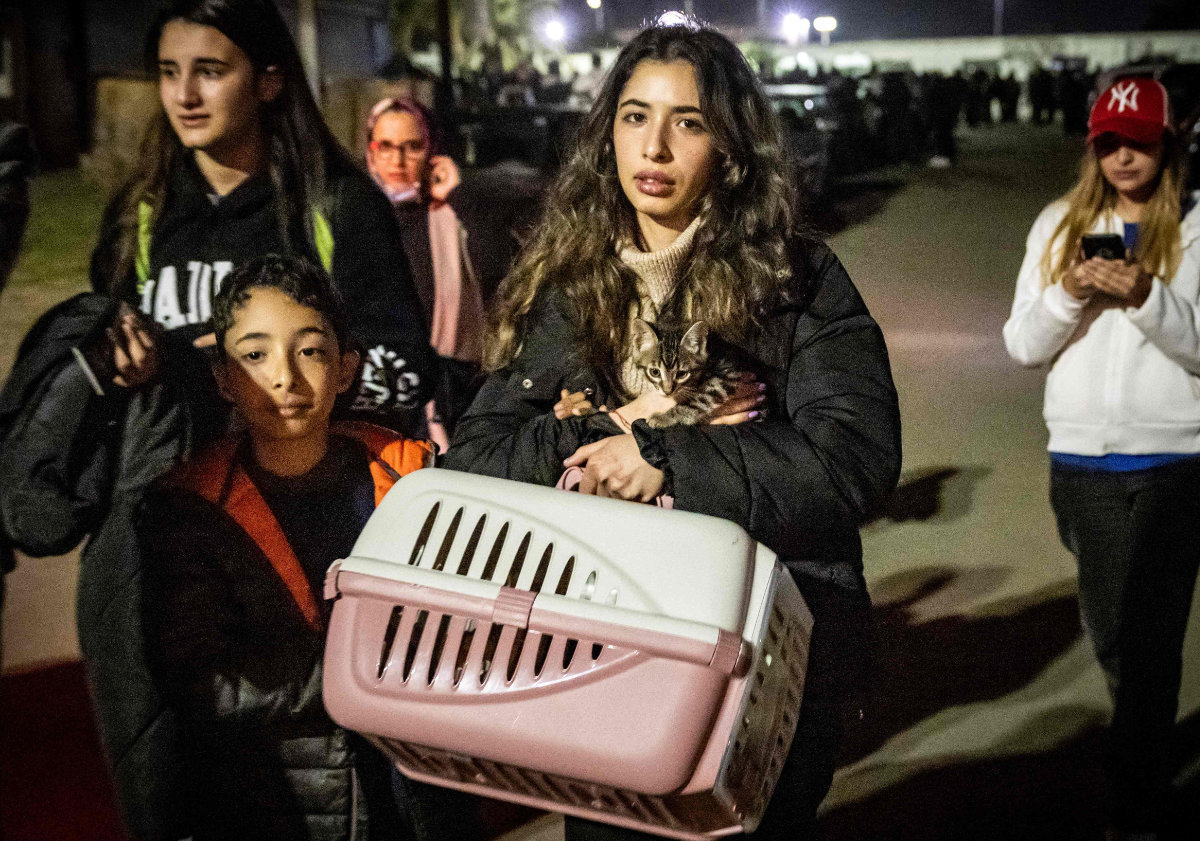
A Moroccan student studying in Ukraine and fleeing the war arrives with her cat to Mohammed V airport in Casablanca on March 2, 2022. (AFP)
Then there is the issue of racist treatment by Ukrainian security forces and border officials. Al-Halabi said at the border terminal, students like her witnessed such behavior firsthand.
Many of her Arab friends, especially those from Morocco and Egypt, and other foreigners experienced prejudice and even violence. Khaled, a Lebanese student, had his phone stolen as he crossed the border.
“They (Ukrainian security) hit us, they cursed us and called us bad names,” she said. “One sentence they said is still stuck in my head: ‘No black people are allowed to come here.’ We were also pushed by the police.”
As a Lebanese citizen who is familiar with life’s adversities, Al-Halabi said, she can understand what Ukrainians are going through. “Still, this is not the way to treat people,” she said. “No matter what happens, you need to treat people nicely.”
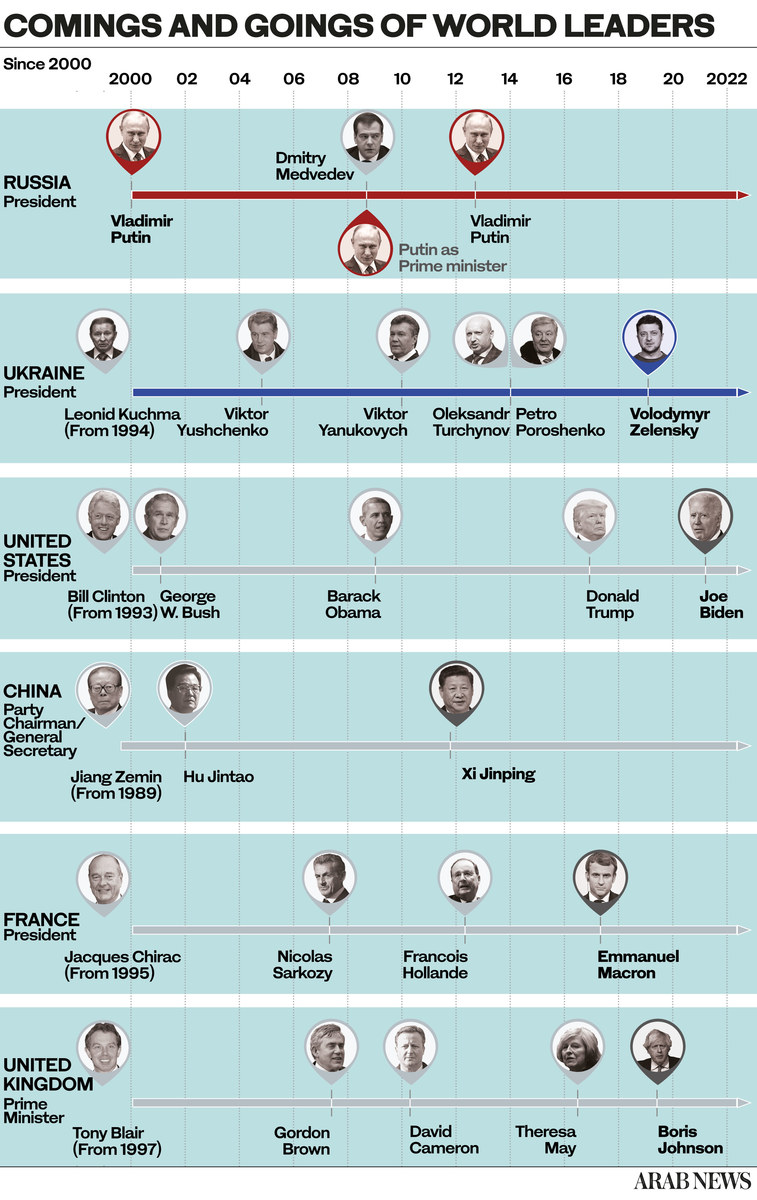
Responding to the accounts of racial discrimination, Ellina Vashchenko, a Ukrainian who lives in Paris, said she “apologizes” for the behavior that non-Ukrainians have experienced.
“There are no excuses for this situation. But I want people to know that not every person is bad,” she told Arab News.
“I am Ukrainian and I have many friends who are helping (foreigners). For example, my friends in Poland have tried to go to the Moroccan embassy to help. My family is open to host anyone who needs help.”
On Wednesday, Al-Halabi was preparing to travel from Krakow to Warsaw, where she hopes to catch a flight to Beirut.
All that she and her brother want now is to return to Lebanon and feel safe. “I don’t know yet what I will do, but I am happy that I am now going back to Lebanon,” she said. “I don’t think I will want to go back to Ukraine even after this war.”
(With inputs from AFP and Reuters)
















